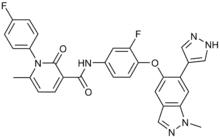Merestinib
Merestinib (LY2801653) is an experimental cancer drug in development by Eli Lilly. It is a small molecule inhibitor of MET and several other receptor tyrosine kinases such as MST1R, FLT3, AXL, MERTK, TEK, ROS1, NTRK1/2/3, and DDR1/2.[1]
 | |
| Clinical data | |
|---|---|
| Routes of administration | PO |
| ATC code |
|
| Identifiers | |
| |
| CAS Number | |
| ChemSpider | |
| UNII | |
| KEGG | |
| Chemical and physical data | |
| Formula | C30H22F2N6O3 |
| Molar mass | 552.542 g·mol−1 |
| 3D model (JSmol) | |
| |
| |
Meristinib is part of a phase II clinical trial for advanced billiary tract cancer. The study is expected to be complete in April 2018.[2] Phase II clinical trials for non-small cell lung cancer and solid tumors began in November 2016.[3]
References
- Konicek BW, Capen AR, Credille KM, Ebert PJ, Falcon BL, Heady GL, et al. (March 2018). "Merestinib (LY2801653) inhibits neurotrophic receptor kinase (NTRK) and suppresses growth of NTRK fusion bearing tumors". Oncotarget. 9 (17): 13796–13806. doi:10.18632/oncotarget.24488. PMC 5862616. PMID 29568395.
- Clinical trial number NCT02711553 for "A Study of Ramucirumab (LY3009806) or Merestinib (LY2801653) in Advanced or Metastatic Biliary Tract Cancer" at ClinicalTrials.gov
- "Merestinib - Eli Lilly". AdisInsight. Springer Nature Switzerland AG.
This article is issued from Wikipedia. The text is licensed under Creative Commons - Attribution - Sharealike. Additional terms may apply for the media files.